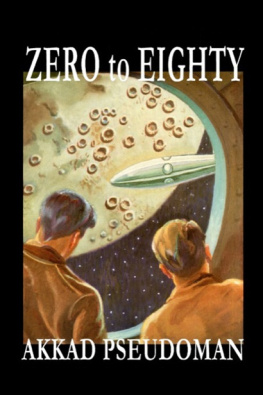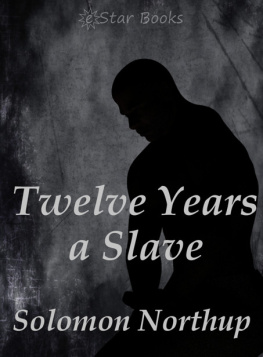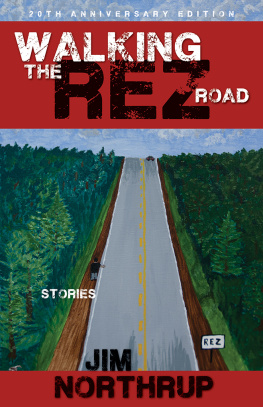Northrup - Zero to Eighty
Here you can read online Northrup - Zero to Eighty full text of the book (entire story) in english for free. Download pdf and epub, get meaning, cover and reviews about this ebook. genre: Religion. Description of the work, (preface) as well as reviews are available. Best literature library LitArk.com created for fans of good reading and offers a wide selection of genres:
Romance novel
Science fiction
Adventure
Detective
Science
History
Home and family
Prose
Art
Politics
Computer
Non-fiction
Religion
Business
Children
Humor
Choose a favorite category and find really read worthwhile books. Enjoy immersion in the world of imagination, feel the emotions of the characters or learn something new for yourself, make an fascinating discovery.
Zero to Eighty: summary, description and annotation
We offer to read an annotation, description, summary or preface (depends on what the author of the book "Zero to Eighty" wrote himself). If you haven't found the necessary information about the book — write in the comments, we will try to find it.
Zero to Eighty, by
Akkad Pseudoman (E.F. Northrup). One of the most obscure and
fascinating of all pre-spaceflight books, this fictional
autobiography includes detailed descriptions (with photos and a
technical appendix) of the first-ever practical experiments with an
electromagnetic railgun. Originally published in 1937. Illustrated.
Zero to Eighty — read online for free the complete book (whole text) full work
Below is the text of the book, divided by pages. System saving the place of the last page read, allows you to conveniently read the book "Zero to Eighty" online for free, without having to search again every time where you left off. Put a bookmark, and you can go to the page where you finished reading at any time.
Font size:
Interval:
Bookmark:
ZERO TO EIGHTY
BEING MY LIFETIME DOINGS, REFLECTIONS, AND INVENTIONS
ALSO
MY JOURNEY AROUND THE MOON
AKKAD PSEUDOMAN
Afterword by Ron Miller
This is a work of fiction. All the characters and events portrayed in this book are fictional, and any resemblance to real people or incidents is purely coincidental.
eISBN: 978-1-62579-024-8
Copyright 2013 by Ron Miller
Cover art by: Ron Miller
All rights reserved, including the right to reproduce this book or portions thereof in any form.
Electronic version by Baen Books
Originally published in 1937
The Ron Miller Science Fiction Classics Collection
PART I: THE CONQUEST OF SPACE
The Archeology of Space Travel
(space travel books from the 18th and early 19th centuries)
The Life and Astonishing Adventures of John Daniel (1751), Ralph Morris, illustrated
Voyage to the Moon (1827), George Tucker
Journeys to the Moon (includes "The Moon Hoax" by Richard Adams Locke, "The Unparalleled Adventures of Hans Pfaall" by Edgar Allan Poe and "Journey...to the newly discovered Planet Georgium Sidus" by "Vivenair", illustrated
Trip to the Moon, Lucian of Samosata
Iter Lunaire (1703), David Russen
A Voyage to Cacklogallinia (1727), "Samuel Brunt"
Gulliver Joi (1851), Elbert Perce, illustrated
The Consolidator (1705), Daniel Defoe
Trips to the Moon
Daybreak (1896), James Cowan, illustrated
The Conquest of the Moon (1889), Andre Laurie, illustrated
Drowsy (1917), J.A. Mitchell, illustrated
The Moon Conquerors (1930), R.H. Roman
A History of a Voyage to the Moon (1864), "Chrysostom Trueman"
The Moon Colony (1937), William Dixon Bell, illustrated by Ron Miller
To the Moon and Back in Ninety Hours (1922), John Young Brown, illustrated
Pioneers of Space (1949), George Adamski
A Christmas Dinner With the Man in the Moon (1880), illustrated
Flights to and from Mars
Doctor Omega (1906), Arnould Goupin (translated by Ron Miller), illustrated
To Mars via the Moon (1911), Mark Wicks, illustrated
A Plunge Into Space (1890), Robert Cromie
A Trip to Mars (1909), Fenton Ash, illustrated
War of the Worlds (includes The Crystal Egg and The Things That Live On Mars), H.G. Wells. Illustrated
Gulliver of Mars (1905), Edwin Arnold
Across the Zodiac (1880), Percy Greg
Journeys to Other Worlds
The Moon-Maker (includes The Man Who Rocked the Earth) (1916), Arthur Train and Robert Wood
A Trip to Venus (includes "Daybreak on the Moon") (1897), John Munro
A Honeymoon in Space (1900), George Griffith, illustrated
The Brick Moon (includes "On Vesta" by K.E. Tsiolkovsky) (1869), E.E. Hale
A Columbus of Space (1894), Garrett Serviss, illustrated
Extract from Captain Stormfield's Visit to Heaven (1909), Mark Twain
Zero to Eighty (1937), "Akkad Pseudoman" (E.F. Northrup)
Aleriel (Voice from Another World, 1874 and Letters from the Planets, 1883), W.S. Lach-Szyrma, illustrated
A Journey in Other Worlds (1894), J. J. Astor. Illustrated
Deutsche im Weltall
(Germans in Space)
By Rocket to the Moon (1931), Otto Willi Gail, illustrated
The Shot Into Infinity (1925), Otto Willi Gail, illustrated
The Stone From the Moon (1926), Otto Willi Gail, illustrated
Between Earth and Moon (1930), Otfrid von Hanstein, illustrated
Distant Worlds (1932), Friedrich Mader, illustrated
A Daring Flight to Mars (1931), Max Valier
Space Travel for Junior Space Cadets
Through Space to Mars (1910), "Roy Rockwood" (Howard R. Garis)
Lost on the Moon (1911)), "Roy Rockwood" (Howard R. Garis)
Rocket Riders Across the Ice (1933), Howard R. Garis, illustrated
Rocket Riders in Stormy Seas (1933), Howard R. Garis, illustrated
Rocket Riders in the Air (1934), Howard R. Garis, illustrated
Adrift in the Stratosphere (1937), A.M. Low, illustrated
Jules Verne
20,000 Leagues Under the Sea, Jules Verne, translated and edited by Ron Miller. Illustrated
A Journey to the Center of the Earth, translated, annotated and edited by Ron Miller. Illustrated
Off on a Comet!, Jules Verne, edited by Ron Miller, illustrated
From the Earth to the Moon (includes Around the Moon), Jules Verne, translated and edited by Ron Miller. Illustrated
The Purchase of the North Pole, edited by Ron Miller, illustrated
Science Fiction by Gaslight
The End of Books (1884), Octave Uzanne, illustrated by Albert Robida
Under the Sea to the North Pole (1898), Pierre Mael, illustrated
Penguin Island (1908), Anatole France, illustrated by Frank C. Pape
The Crystal City Under the Sea (1896), Andre Laurie, illustrated
The Earth-Tube (1929), Gawain Edwards (G. Edward Pendray)
PART II: FIREBRANDS OF SCIENCE FICTION
Heroines
Three Go Back (1932), J. Leslie Mitchell
The Flying Legion (1920), George Allen England, illustrated
The Island of Captain Sparrow (1928), S. Fowler Wright
Under the Sea to the North Pole (1898), Pierre Mael, illustrated
Fugitive Anne (1904), Rose Praed, illustrated
Lentala of the South Seas (1908), W.C. Morrow
The Girl in the Golden Atom (1923), Ray Cummings
Maza of the Moon (1929), Otis Adelbert Kline
Bad Girls
Atlantida (1920), Pierre Benoit
Out of the Silence (1928), Erle Cox
Swordwomen
The Lost Continent (1900), C.J. Cutcliffe-Hyne
The Legend of Croquemitaine (1874), Ernest L'Epine, illustrated by Gustave Dore
Not Quite Human
The Beetle (1897). Richard Marsh, illustrated
Carmilla (1872), J. Sheridan LeFanu
The Lair of the White Worm (1911), Bram Stoker, illustrated
The Life and Adventures of Peter Wilkins (1751), Richard Paltock, illustrated
The Sea Lady (1902), H.G. Wells, illustrated
Angel Island (1914), Inez Haynes Gilmore
The Future Eve (1926), Villiers de L'Isle-Adam, illustrated
The Coming Race (1871), Edward Bulwer-Lytton
ZERO TO EIGHTY
This imaginative story of achievement is gratefully dedicated to Dr. Guilliam Henry Clamer whose vision has brought him a success which he has generously shared with his associates.
PREFACE
IT has been the authors thought in writing this book, first, to familiarize the lay and technical public with the vast possibilities latent in the production of high linear velocities by the use of electrically produced travelling waves of magnetic force; second, to give expression to a long-held conviction that very often a seemingly unattainable achievement may be realized by one who possesses imagination, optimism, fixity of purpose, courage, scientific honesty, and a moderate endowment of intelligenceprovided all these qualities are crowned with unremitting labor.
The reading public is generally more interested in the activities and achievements of individuals than in impersonal matters, however important. For this reason the narrative is presented as the autobiography of a wholly fictitious individual who is born in the year 1920, and who reviews in his eightieth year his lifes career and accomplishments.
Next pageFont size:
Interval:
Bookmark:
Similar books «Zero to Eighty»
Look at similar books to Zero to Eighty. We have selected literature similar in name and meaning in the hope of providing readers with more options to find new, interesting, not yet read works.
Discussion, reviews of the book Zero to Eighty and just readers' own opinions. Leave your comments, write what you think about the work, its meaning or the main characters. Specify what exactly you liked and what you didn't like, and why you think so.















